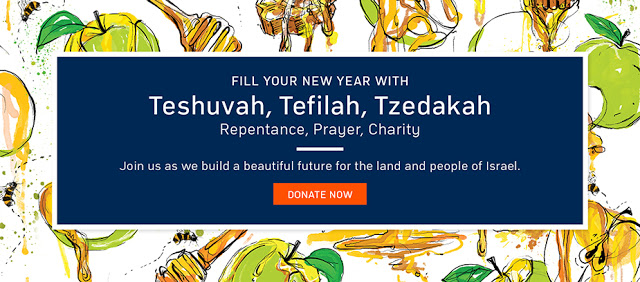FILTER
IMPACT BLOG
Email: customerservice@jnf.org
Sep 12, 2018 By Yossi Kahana Category: Education,
Tzedakah in the new year: Charity helps donors as much as recipients

The week between the Jewish high holidays of Rosh Hashana and Yom Kippur is an auspicious time to give charity to merit a good year and a long life. As we recite on these holy days, "Teshuvah, Tefilah, Tzedakah -- repentance, prayer, and charity -- alleviates the negative decree. May we all be worthy of being written in the book of life for the coming year. Donate to Israel.
Tzedakah. It's the Hebrew word for charity -- for giving assistance and money to the poor and needy, and to other worthwhile causes. It's the responsibility to give a portion of one's personal substance for the common good. But it's more than giving money. Done properly, tzedakah requires the donor to share his or her compassion and empathy along with money. Judaism teaches that donors benefit from tzedakah as much as, or more than, recipients.
In the Torah portion Re'eh, we find the mitzvah of aser te'aser, literally translated as "tithe you shall tithe," referring to the obligation to set aside a 10th of our earnings for charity. Since the word for "tithing," aser, has the same root as "wealthy," ashir, the Talmud interprets this verse as "Tithe in order that you shall become wealthy."
Since we left oppression in ancient Egypt, the Jewish people have been obsessed with the act of charity. When, in the 4th century, the Roman Emperor Julian ordered hostels set up for transients in every city, he referred to the example of the Jews "in whose midst no stranger goes uncared for." Historical records from every era show that everywhere, Jews gave to those less fortunate, creating charitable organizations to provide for these people -- free loan funds, soup kitchens, wedding funds, widow funds, orphan care, new mother care, free education, and much more. There wasn't a Jew who wasn't either giving, or getting. And often both.
Most Jewish homes had the famous Jewish National Fund blue box for depositing tzedakah coins for charity; it was the method of donation Israel was built on. From early childhood, Jewish children learned their responsibility was to care for other Jews in need. Though the methods of giving may now be more complex, the motivation for tzedakah endures through the centuries: to sustain the Jewish people, enhance Jewish life and strengthen the Jewish community for today and the future.
During daily prayer services, a pushke (or charity box) is commonly passed around as part of the service, meaning prayer and charity go together. And it's not just you -- a pushke elevates your living space as well. "A charity box in a home or office," the Lubavitcher Rebbe taught, "redefines the entire space. It is no longer just a home, just an office. It is a center of kindness and caring."
Tzedakah is not limited to gifts of money. Sharing time, expertise, or even a kind smile are all forms of charity. No matter how much you were blessed with, you can always share with others. Visit the JNF- USA website Ways to Help to make a difference to the land and people of Israel.
Tzedakah. It's the Hebrew word for charity -- for giving assistance and money to the poor and needy, and to other worthwhile causes. It's the responsibility to give a portion of one's personal substance for the common good. But it's more than giving money. Done properly, tzedakah requires the donor to share his or her compassion and empathy along with money. Judaism teaches that donors benefit from tzedakah as much as, or more than, recipients.
In the Torah portion Re'eh, we find the mitzvah of aser te'aser, literally translated as "tithe you shall tithe," referring to the obligation to set aside a 10th of our earnings for charity. Since the word for "tithing," aser, has the same root as "wealthy," ashir, the Talmud interprets this verse as "Tithe in order that you shall become wealthy."
Since we left oppression in ancient Egypt, the Jewish people have been obsessed with the act of charity. When, in the 4th century, the Roman Emperor Julian ordered hostels set up for transients in every city, he referred to the example of the Jews "in whose midst no stranger goes uncared for." Historical records from every era show that everywhere, Jews gave to those less fortunate, creating charitable organizations to provide for these people -- free loan funds, soup kitchens, wedding funds, widow funds, orphan care, new mother care, free education, and much more. There wasn't a Jew who wasn't either giving, or getting. And often both.
 |
| The famous Jewish National Fund Blue Box, est. 1901. |
During daily prayer services, a pushke (or charity box) is commonly passed around as part of the service, meaning prayer and charity go together. And it's not just you -- a pushke elevates your living space as well. "A charity box in a home or office," the Lubavitcher Rebbe taught, "redefines the entire space. It is no longer just a home, just an office. It is a center of kindness and caring."
Tzedakah is not limited to gifts of money. Sharing time, expertise, or even a kind smile are all forms of charity. No matter how much you were blessed with, you can always share with others. Visit the JNF- USA website Ways to Help to make a difference to the land and people of Israel.
